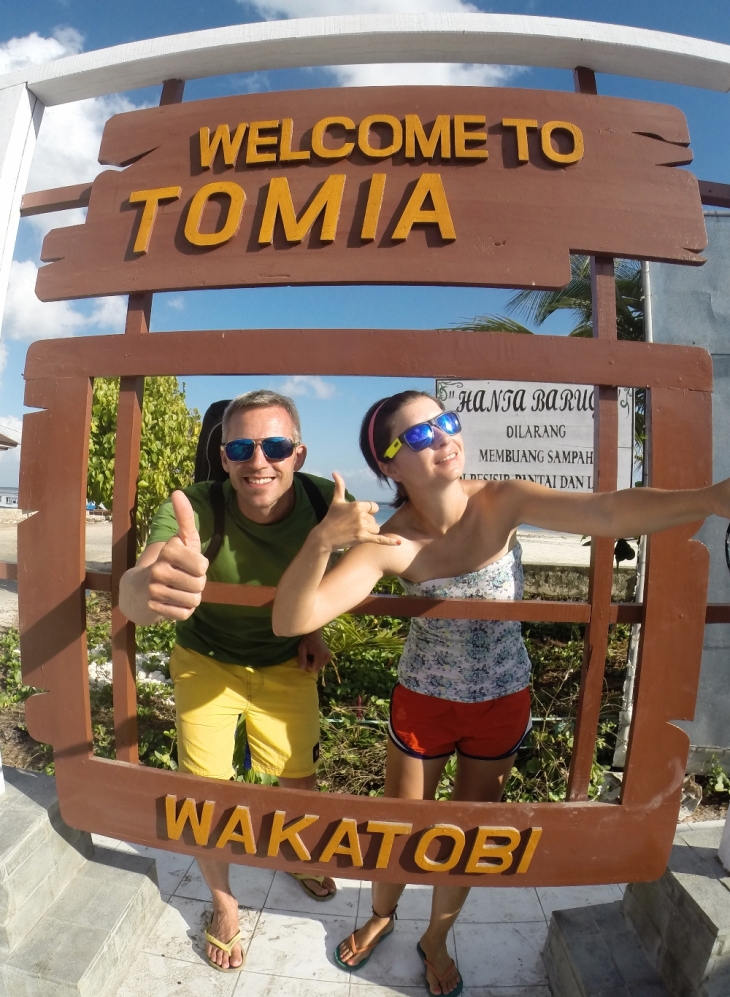
“They won’t get away with this!” the German was shouting over the outboard motor. “You bastards know no limits.” She glared at the police boats glimmering over the blue crystal waters.
Her well-tanned hands were shaking in anger, but Yudi, the divemaster sat pensively by, staring at the black-trimmed boats. Their stalwart guards fixed binoculars back on him. In the background, past the lush reefs spilling rainbow colors up through the waters, shimmered the swanky resort, one of the most opulent and expensive destinations of the entire Indonesian archipelago. Yudi ran his fingers through his long curls, sighed, and concluded the standoff, “Yes, they might make trouble for me at the next city meeting. But no need for you to worry. We can dive elsewhere.”
He signaled to the pilot, who eased the throttle down, swinging our boat in a graceful arc away from the authorities. The German diver loosed a string of profanities into our wake, which lapped harmlessly in over the bow of the police cruiser.
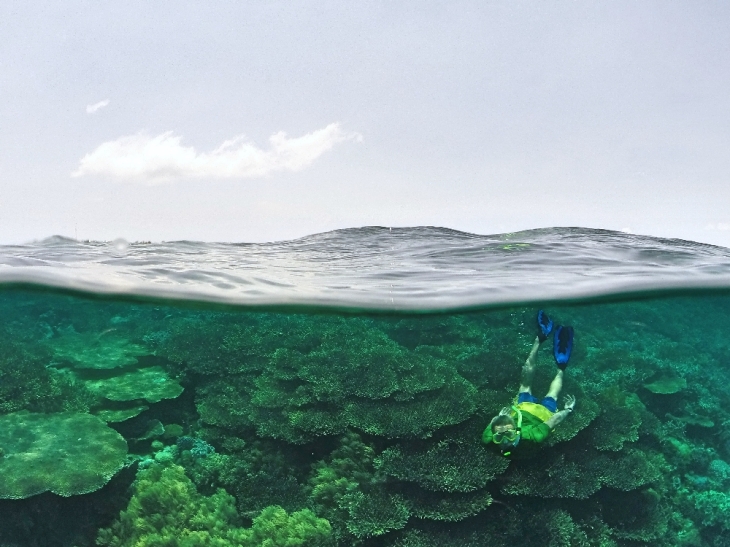
Checking out what lurks below
***
Generally, the police in Indonesia leave me alone. Sure, there was that time the chubby one stopped me on my motorbike, looking for a bribe. And yes, there was once when Andy and I got waylaid at Jakarta’s Monumen Nasional—but only for a Hello Mister picture with a squad of the capital’s finest, on their official police motorcycles, of course. But most times and places, they leave me alone.
So it was kind of a shock to arrive at the diving mecca of Pulau Tomia and be accosted for snorkeling on the wrong reef—or actually, a public reef a bit too close to a certain swanky resort. Yep, that little offense earned us a visit from the unofficial five-oh: them skimming along in their fancy little rig, us shivering out of the water and chugging away in our diesel fuel and box lunch special.
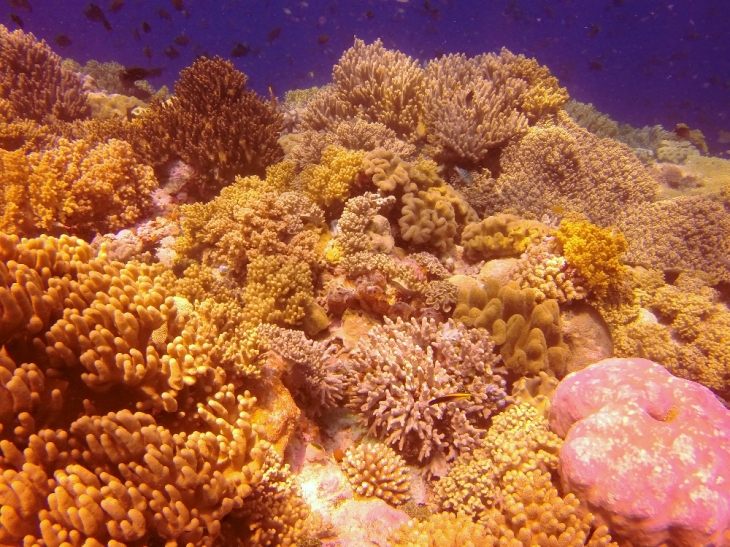
The magical reefs
Pulau Tomia: a gorgeous island, imposter water cops, a raging German diver, reef-borne contentions, and a long-haired, early-thirties medical doctor in the center of the maelstrom.
Yes, Pulau Tomia is quite possibly the most gorgeous little piece of real estate available on this—or any other—planet. The beaches’ white powder is rivaled only by Aspen’s slopes; the green hills tower imposing views on the surrounding landscape, and those vistas encompass the most pristinely turquoise glades of water any island of paradise could be blessed with.
That’s only the top half, though.
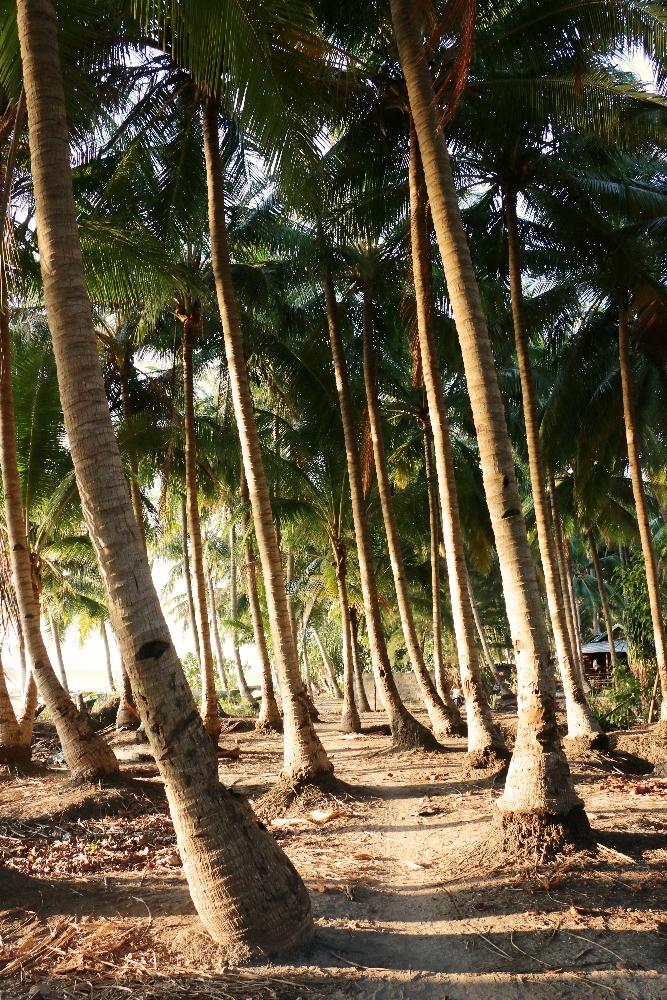
Stroll here. Trust me.
Under that water lie reefs that puts the Caribbean to shame, that make the Red Sea whimper in envy, that stand their ground next to even the proud giants of the Great Barrier and Raja Ampat, and ask no inch of quarter. Yes, we’re talking world-class stuff, we’re talking more creepy, frilly, fluorescent, transparent absurdities of the deep than any other region in the world; we’re talking size and variety and abundance of sea life rivaled only by the biggest shots of all.
Pulau Tomia – centerpiece of the Wakatobi archipelago—is perhaps best known for holding the title of Jacques Cousteau’s favorite spot to dip into the watery underworld. Yes, Pulau Tomia is queen of them all: Sparkling in summer jewels and fruit, wrapping herself up in all this beauty, lounging expectantly in the Celebes sun, inviting you to come take a sunny little dip in the wonders that she spreads for you.
Until, of course, the police come to chase you away.
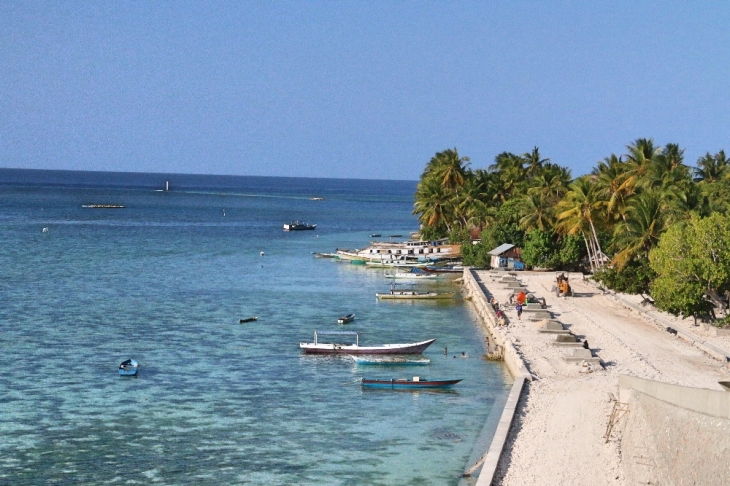
The inviting wharf
Well, to be fair, they weren’t real police. And they didn’t chase us off every reef.
But for that to make sense, maybe I better tell about that divemaster named Yudi first.
***
I got to know him over the phone, actually, waiting for a boat on nearby Wangi-wangi. “Yes,” he yelled into his speaker over a storm of background noise. “I have availability for Thursday. A big group is coming in. I still have a room, though.”
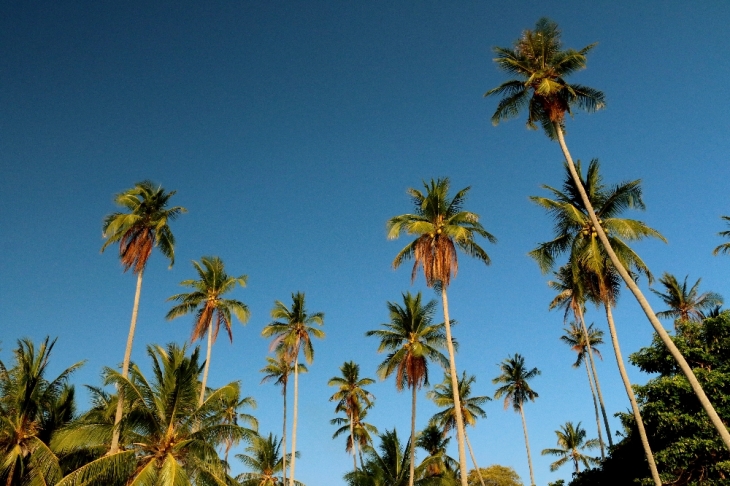
“Perfect,” I shouted, over my own background noise of ships and motorbikes and marketplace haggling of the Wangi-wangi port. “See you on Thursday!”
Andy and I thought it was as simple as that—get a name of a guest house owner and show up. It’s not like these Wakatobi islands have that many guest house owners. Everyone knows them by name, it seems, and can send you straight to their doorstep. And since this guy was known several islands over, Yudi, we thought, is a sure thing, an easy fix for the Tomia portion of our Wakatobi whirlwind.
Imagine Andy and my surprise, then, when our diesel-blazing, moldy old chuggling wash of a public boat pulled into the gorgeous harbor of Tomia, when we lugged the backpacks and snorkel-gear ashore, and we stopped and stared a moment at the sleepy little town basking at the waves’ edge in the midday heat, and no one knew Yudi’s place.
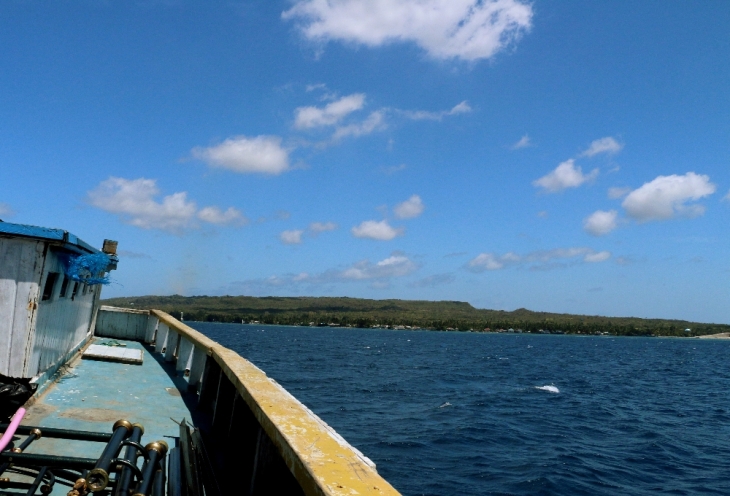
“Hmmm,” one motorbike driver mused, “maybe it’s there—the guest house with the blue roof. Hundred meters that way.”
“No,” I replied, “he said we’d need a ride—that it was ten kilometers from the port.”
“Yes,” replied a grizzled old smoker listening to our conversation, “Ten kilometers from the south port. But your boat came in at the west port. Look, the place is right here. It’s the one with the blue roof. Yudi does some business with the place there.”
“No,” I said, “I need Yudi’s place. The one Yudi owns.”
“Hmmm…” said a young man with a Dive Wakatobi tee-shirt and a well-aged pair of flip flops. “You mean Doctor Yudi of the Tomia Scuba Dive. He has no place. He only dives.”
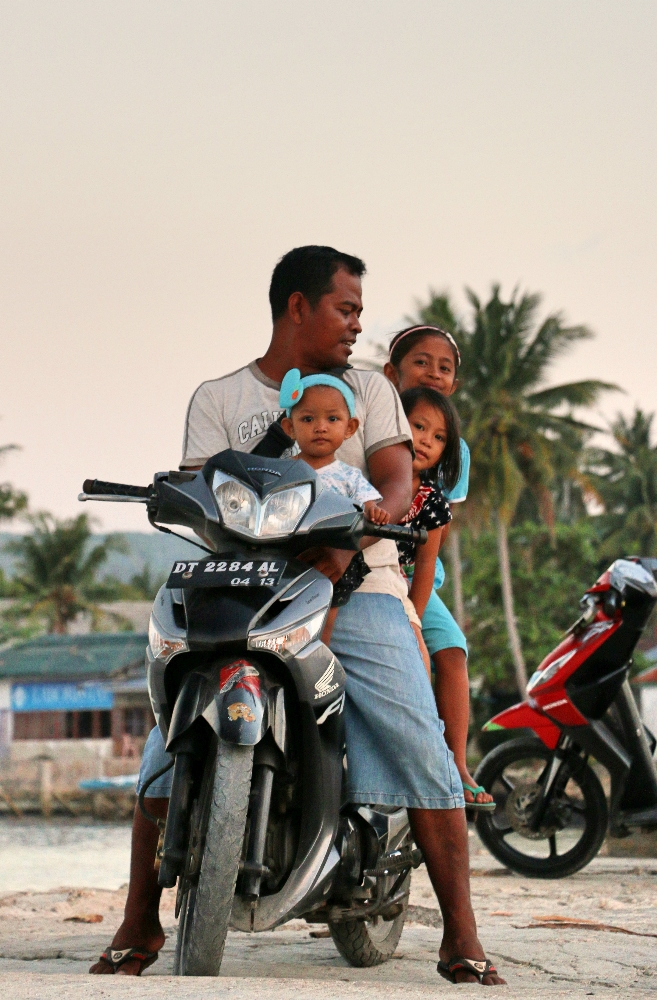
By now Andy was getting a little antsy. “What was the name of the hotel you booked?” she half-whispered, trying to pull her attention away from the gorgeous scenery already flying into her Canon lens.
“I… I don’t know the name of his place. I just knew it was Yudi’s.”
“Tomia Scuba Dive,” the three wise men of the wharf chimed back. “Hundred meters that way, with a blue roof.”
We shrugged and lumbered off. All this was quite unheard of—an island with a mystery guest house owner that no one knew. A Yudi with nothing more than a name and a reputation on neighboring island, and a phantom guesthouse on a tiny plot of paradise that residents with decades of experience ringing the island on both land and sea, couldn’t place. We trudged off the wharf and through the only intersection in the village. To the left, a forlorn, dusty little concern with a blue sign but no blue roof. To the right, a stretch of homes, a fast food stand, and a few men sleeping off the afternoon heat on the seats of their motorcycles.
“Who is this Yudi,” Andy asked again, “that you booked with?”
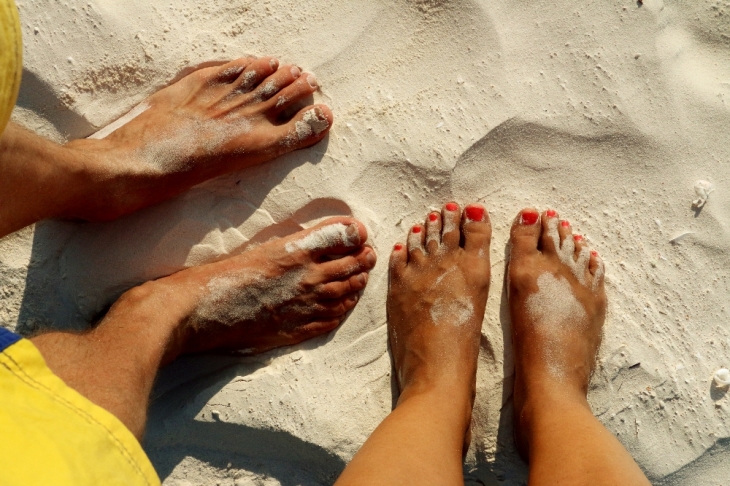
“I don’t know. The guys on Wangi-wangi said he was good. I thought he was like the old know-it-all of the island, the patriarch with the connections, you know?”
“So he’s old?”
“I don’t know.”
“Is he a doctor, like those guys were saying?”
“I don’t know.”
“Does he have a dive sho—”
“I don’t know.”
The children were starting to appear in the doors and windows of home, stealing glances at the incoming strangers. We continued down the dusty street.
“What do we know?”
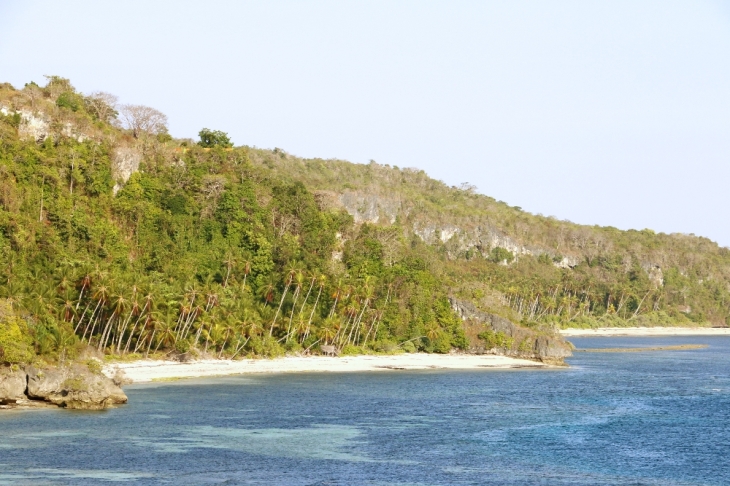
***
An hour later, we’d found Yudi’s place, and by dinner time, we’d learn his story.
The former involved plenty of high-fives for the crowds of gathering kids and some patient explanations for the matronly ladies running Doctor Yudi’s clinic—medical clinic, not diving. “Let me check on the three guesthouses around, one told us. “I think you’re in the Abi Jaya.”
A series of our protests and sending messages by means of those kids hanging around—that’s what adults did before text messaging came about, by the way—and we discovered that Yudi isn’t in the guesthouse racket at all; rather, his dive shop and dive guide service helps coordinate rooms at a handful of the local lodges, netting a string of reliable business for them.
In exchange, he keeps himself supplied with a clientele of divers that keeps him out on the reefs and out of the office, and a burgeoning economy for the locals who may, one day, need to use (and pay for) his medical expertise.
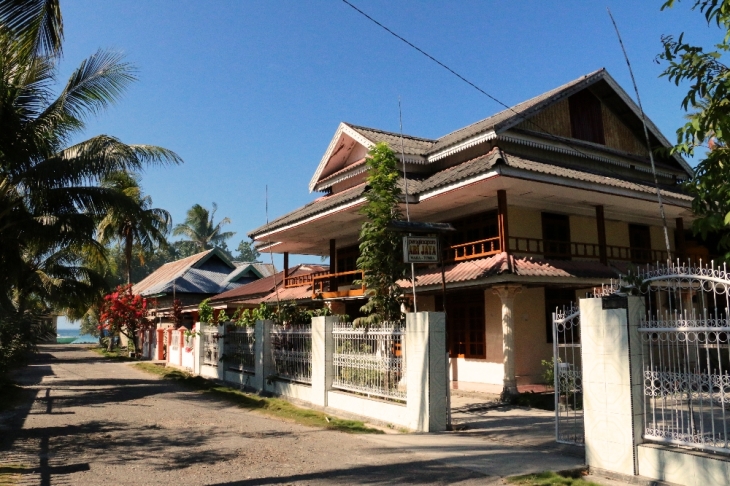
For the time being, though, we were gorging on fried fish and fried rice and haggling over terms of a motorbike rental, and in another hour we found ourselves on the most perfect little stretch of tropic strand a postcard could ever fantasize for itself. Sky-scraping palms and powder sugar sand. It wasn’t necessarily an easy beach to find—a tiny gravel lane splintering nearly unnoticed from the main thoroughfare, a winding path through the cassava fields, and a craggy descent so steep we nearly fell over the handlebars.
At the base of the rock, a dozen girls and women circled in laughs and gossip under the deep shade of a grove of towering palms. In peals of laughter and stoic lulls of silence, they split open sea urchins, washed them in a salty black brine, and heaped the innards into pots and buckets for future soups. Andy stopped in her headlong sprint toward the surf, turned, and approached.
Within three minutes she was in the circle, laughing with them and filming the ritual. They, in turn, treated us to salty handful of urchin guts so fresh they stung our taste buds.
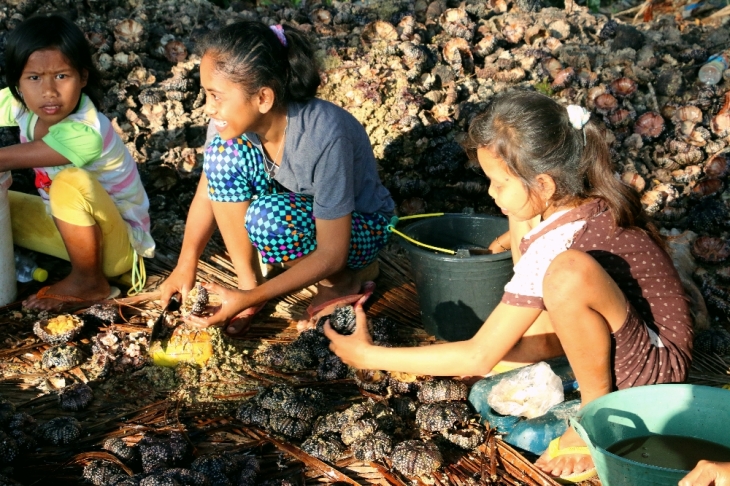
What does a fresh sea urchin taste like?
Salt water, mostly.
At the ocean’s edge, the men of the households were shoveling canoe-loads of the spiky black urchins into coarse nets. From there, they shook and tossed the nets back and forth until the dangerous spines were snapped and the hulls ready to be brought to the women. There, in the fading light of our first day on Tomia, we witnessed the ritual harvest of an abundance—more like two or three abundances—of sea urchin flesh.

“Man, I could go for some sushi, right now,” Andy told me as we churned that motorbike’s engine up the hill. Gallons of sea urchins, a beautiful sunset to boot, but still no sign of the mysterious Doctor Yudi.
Yudi himself? Well, he would show up a little later—board shorts like a surfer and a dry-fit tee emblazoned with “JUST ADD WATER.” I didn’t know it was Yudi. I wouldn’t have guessed he was a doctor. I thought he must have been a Jakartan techie getting away for a little vacation to the isles of charm and corals.
But that’s not Yudi—not by a long shot.
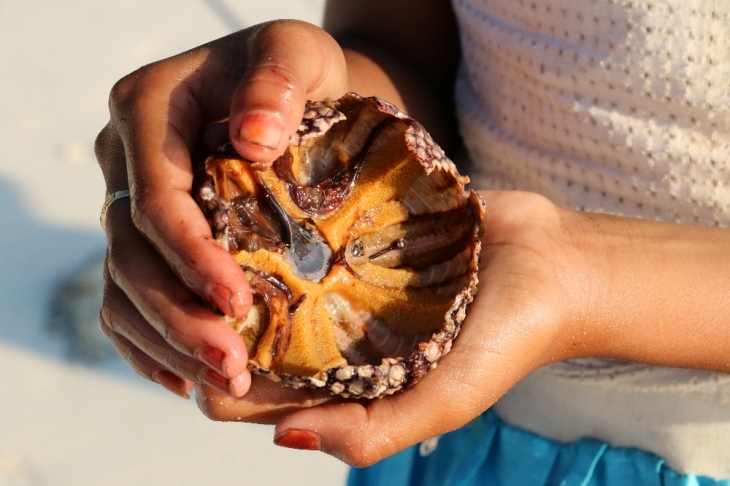
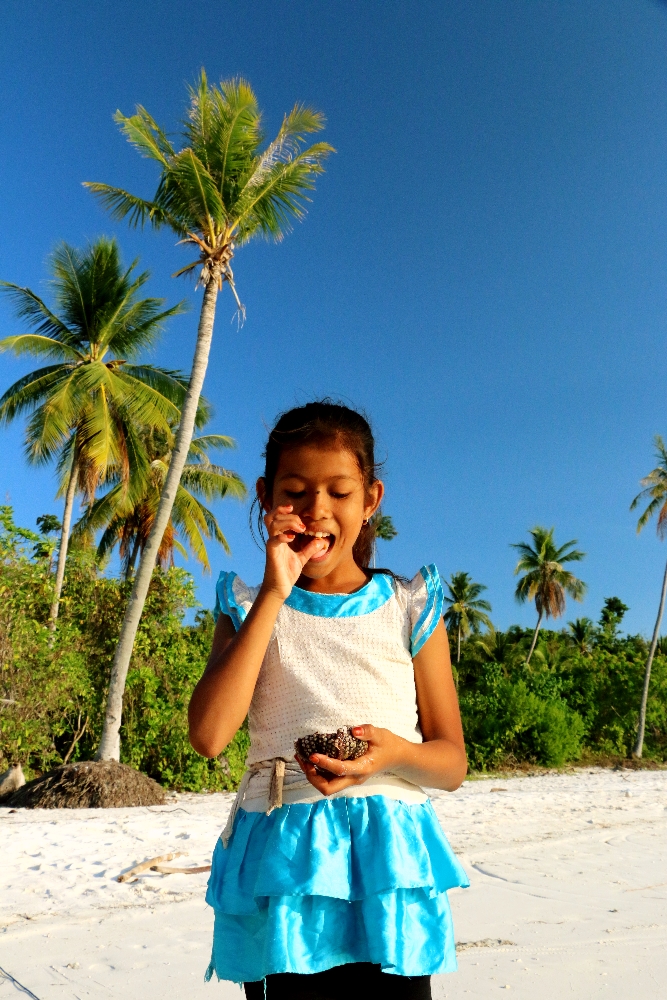
Over the next three days, I’d learn a little about this guy. Dashing across the island’s central hills in the pre-dawn gray, we’d talk about his parents—aging Chinese business owners in Jakarta who set him out on his path to becoming a doctor. Over lunch scarfing down plates full of spicy fried rice, he’d explain why he’s in Tomia – Indonesia requires doctor to perform a two-year stint in the outlying islands, and Yudi, on a whim, requested Tomia because he knew it had cool reefs, even though he’d never been on a scuba dive in his life. And in the sun-blasted hours we’d spend plowing through the crystalline surf surrounding Tomia and its satellite reefs, he’d unfold some of his dreams—for his parents to come visit the life he was forging for himself in Tomia, to show them his diving operations he was heading up, and maybe to see them smile and affirm his life choices.
Being an only child of a minority ethnicity can be a burden. Yudi’s parents, like many Chinese-Indonesians, have been rooted in this language and culture for centuries. Yet they’ve proven doggedly loyal to traditions and have largely resisted assimilation by marriage and religion. Parents push children hard, expecting not merely academic success early on, not merely professional excellence later, but to start a business.
Yes, the cultural practice of so many of the Chinese populating the shores of Indonesia’s islands is the small business. A coffee shop, a barber shop, a tee-shirt short, an electronics store—nothing beats the investment opportunity of your own business. Some take off. Some fail. But the expectation remains—you have a life, you save some capital, you start a business.
Yudi, exiled for two years on Pulau Tomia, looked around him. He was a lonely minority in a paradise of divers. He didn’t just need a business to make some retirement funds; he needed one to occupy his spare hours, to keep him from jetting off on long boat and plane rides to Jakarta every chance he got, one to immerse himself in through the lazing island hours’ time off.
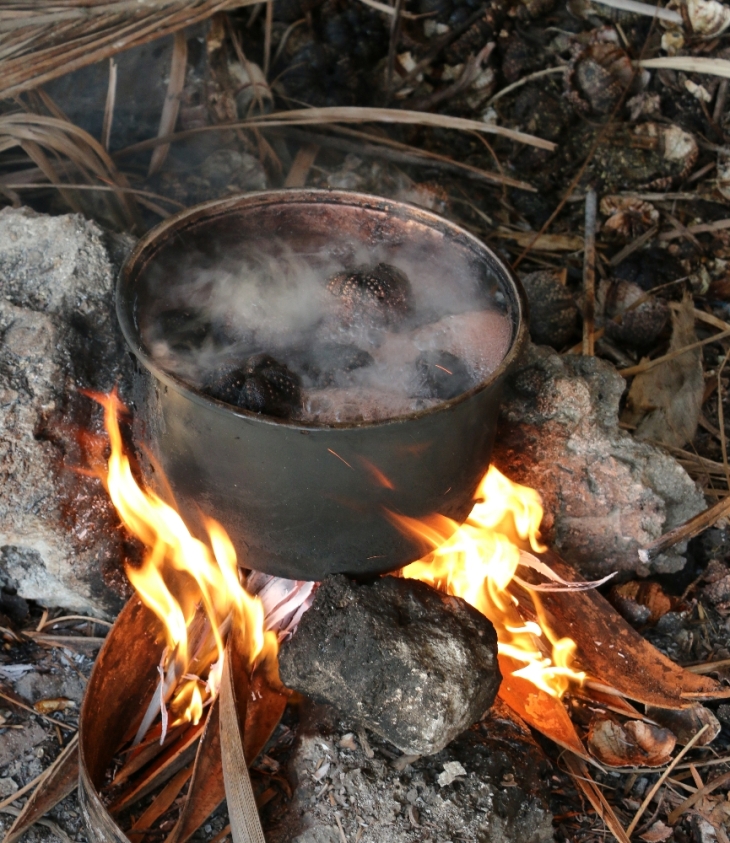
Where was the action? Where was the money? Where was distraction from a solitary existence?
In the water.
Tomia Scuba Dive was born while Yudi was still a guppy in the diving world. But he saw a market niche to be exploited, and he zeroed in on that target.
And he hit it.
Which is precisely why the resort strong-arms came cruising out to visit our innocent little excursion that sparkling morning. That’s exactly why Yudi stared so pensively before capitulating. That’s precisely why, even though he lost the battle and dodged the ensuing town-hall flak from the confrontation, he’s not going anywhere.
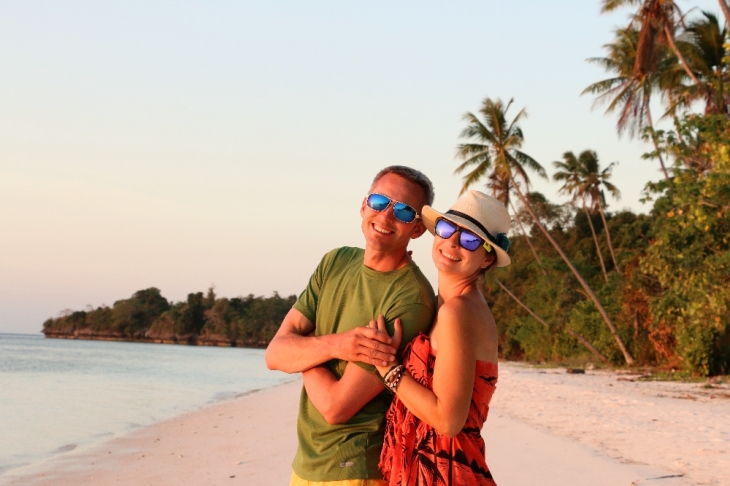
***
Here’s what you’re missing—and you’ll need to back up twenty years and to a neighboring island for this one. The legend goes like this: back in ’95 – or somewhere thereabouts – a young Swiss man was volunteering some time on nearby Pulau Hoga, another Wakatobi gem, famous for hosting a hundred backpacking students in summertime reef conservation program, and was fairly enthralled by the natural beauty and the unspoiled nirvana of the Wakatobi archipelago. So, having a little experience in the hospitality industry, and a little capital at his command, he bought a beach on a tiny sliver of island across the channel from Tomia, and opened a tiny resort—something like four rooms.
Wakatobi Dive Resort was born.
The swarthy man on the roof of the boat told us this story between puffs on a clove cigarette, ubiquitous treat of smokers of the archipelago. Tomia loomed in the background, a green spike of verdure and angles piercing the blue horizon. Our boat chugged toward it, painfully slow, and the barrel-chested man continued his story.
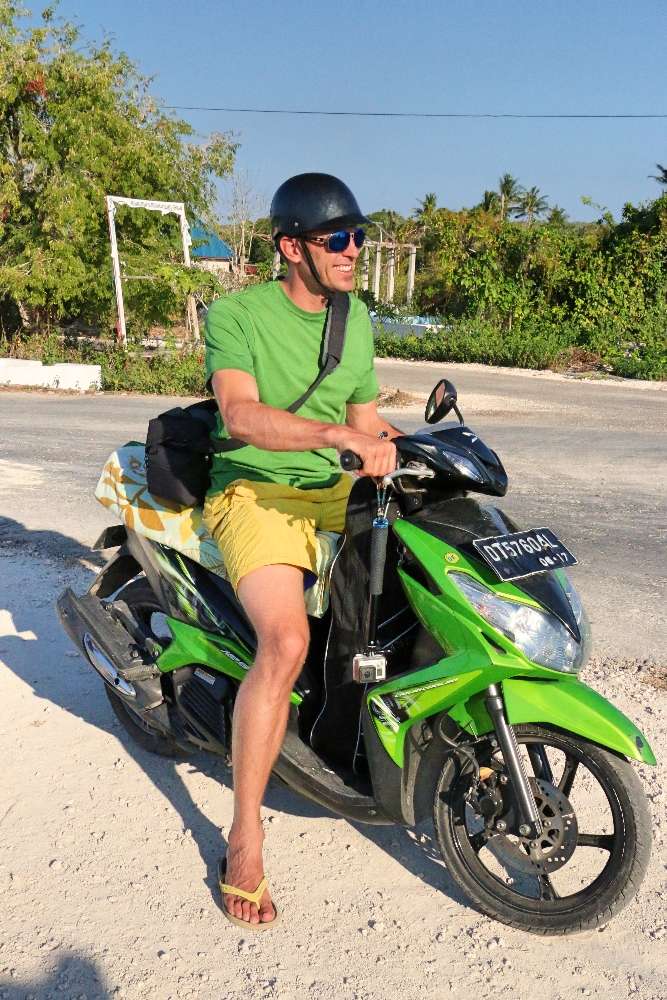
“Look beside that shore on the right,” he pointed with a weathered hand. “That’s the resort. I used to work there as a dive master,” he told us, and waited for us to be sufficiently impressed. “The clients are very wealthy. They fly in on a private plane from Bali, with thousands of dollars in equipment. They stay for a very long time. They sometimes leave a tip that’s worth more than the equipment. Or sometimes leave the equipment itself.”
Andy and I looked at one another under the glare of the Wakatobi sun. A glowing breadth of garden stretched across the distant beach.
Even at a distance, we could tell.
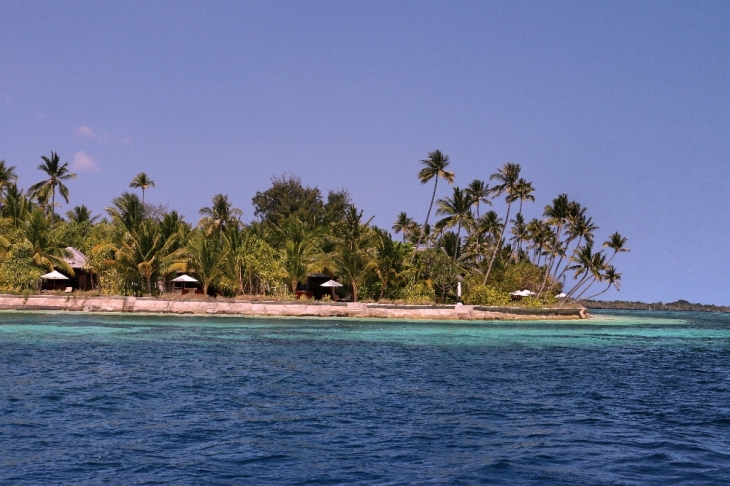
It wasn’t some aging matron of wrinkled resort. This thing was young and classy. A blonde little socialite of a resort sipping a Mai Thai behind oversized shades and stretching long, tanned legs for kilometers of beachfront view. Classy and forever young.
And claiming to be a former divemaster of hers seems to be a common theme chatting with locals around Tomia.
A drunken group of fishermen watching the sunset and sipping unknown liquid from a plastic cup, made the same claim to us later that evening. The sun had set, Andy and I had wrapped up our sunset photo shoot, and our bike was waiting somewhere in the darkened grove of sugar palms and underbrush.
As we headlamped our way through the beached boats and the anchor lines, we were greeted by a gaggle of very happy fishermen passing around dixie cups and a plastic water bottle of an unidentified, but quite fragrant, clear liquid. We chatted, learned and forgot their names, and heard their version of the Wakatobi Dive Resort story.
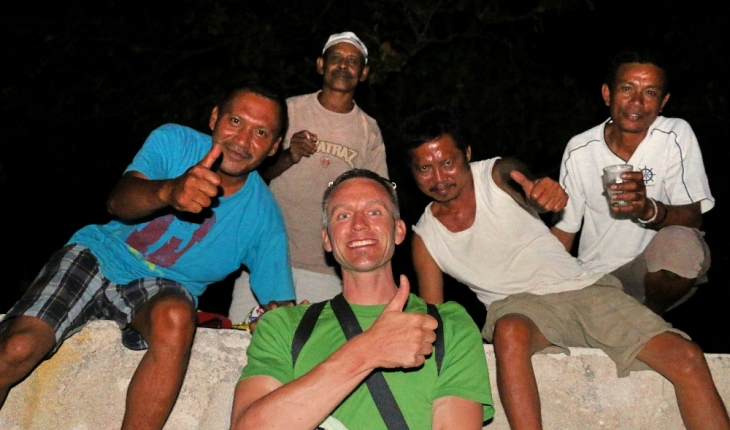
One man, the talker of the group, smiled through a handful of selfies with us, told us all about his cousin living in Uruguay, about his own recent trip there, and of course, about his time leading dives in the WDR. “We were always very tired,” he remembered into the stars. “They always had more dives, more dives. Three, four a day. We go every day.” He shook his head and took another swig. “They didn’t pay us much.”
“But he!” his drinking buddies pounded him on the back. “Has been all the way to Uruguay!” The speaker smiled sheepishly, but enjoyed the proud exultation of his comrades. It’s not every day a humble man from these tiny isles can make it all the way to another ocean.
The resort must be doing something right.
“This much must be true,” I took up the story the next morning, speculating to Andy in the back of a pickup truck cruising across the island for a sunrise view. “Look at the roads here—smooth and new and fewer pot-holes. Look at the mosques—shiny, big, and new, replete with tiled domes on top. Look at the homes—block and mortar and resting on the ground. Remember in Kaledupa—those guys had wooden shacks on stilts that were falling apart. You see the people here have more resources.”

By all accounts, Tomia’s got some comparative affluence over the rest of Wakatobi. Consider the following evidence: Tomia residents can occasionally be seen sipping a little Coca Cola and not just hacking open coconuts. It’s even got a hillside park with enormous letters spelling out “TOMIA.” Mosques have fresh coats of paint and shiny minarets.
But to return to the fishermen’s story: this Swiss guy, he started flying in his friends, started hiring more locals, and started his business growing. He used to boat all the guests in from Kendari on nearby Sulawesi. That was before he had a private plane coming in from Bali.
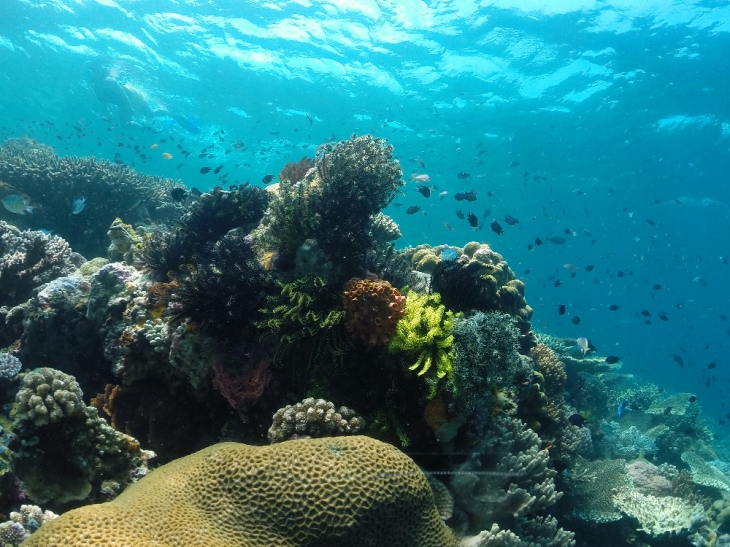
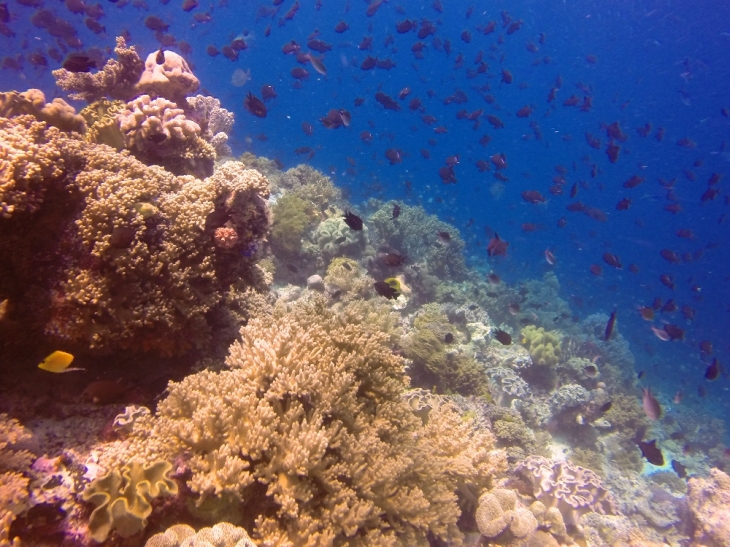
And it grew, Yudi told us the next day on his boat, as we cruised back through the warm, morning air to the port. It grew and so did its influence. Soon he had local towns in his pocket, unofficially, of course, because his resort was quietly making Tomia the most prosperous of the Wakatobis. “There it is,” Yudi pointed to the five-star glory as we chugged across the channel to a dive spot in Tomia’s lee. “They share that island with a Bajo village. They pay the villagers not to dynamite fish the reefs.”
“They pay?”
“Well, maybe not pay pay. But the resort makes its own electricity, and it has constant water. So they share with the villagers.” Now the story was starting to make sense. A little backwater bartering of commodities meant that this resort was accomplishing what government spending and national park status had been designed, but couldn’t quite manage, to accomplish. A little luxury in exchange for the locals’ cooperation—even active involvement—in protecting the reefs.
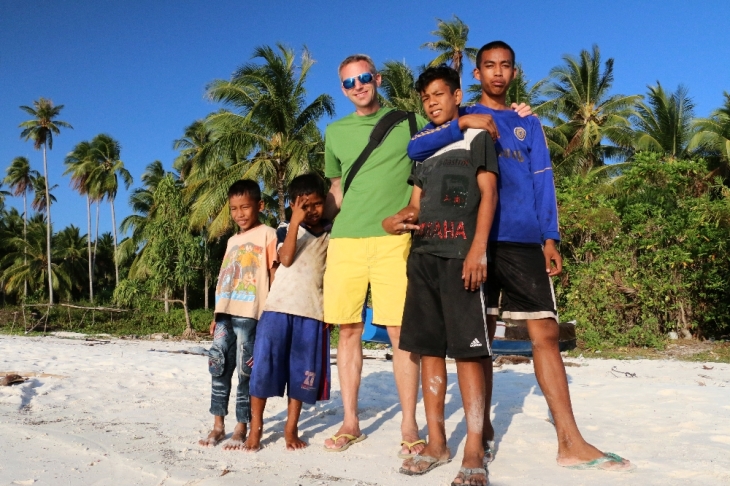
I nodded in agreement and tried to follow his gaze to the horizon. Neighboring Kaledupa, in the same waters, same currents, same climate, has no real reefs to speak of. They’ve all been blasted and overfished by shortsighted fishers needing small money quick. They didn’t have a mega-resort around to magnetize the population into its will, to drag them by the nose into a conservation sort of mind while consumerism sat around the corner, glass beads in hand to trade for their reefs.
The result has been this: At the same time as the neighboring islands were sliding toward coral devastation, Tomia’s high-dollar resort was keeping itself perched atop the diving world. Raising itself higher, actually, in comparison to its sinking neighbors.
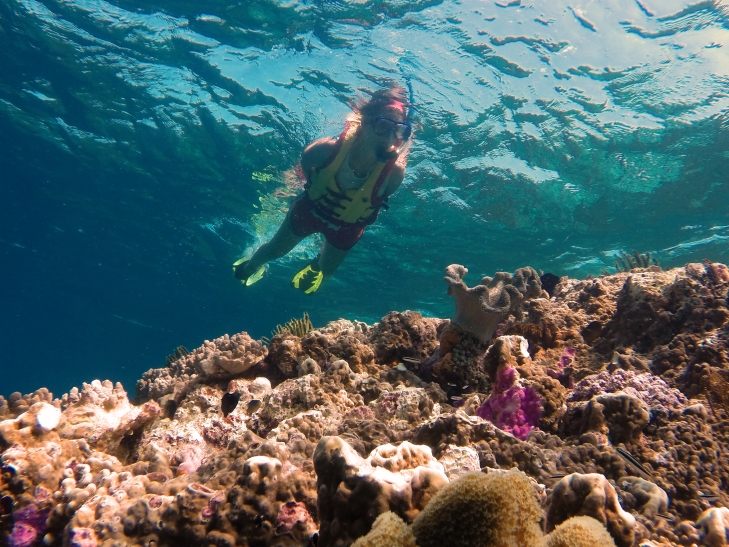
“Sometimes the villagers get jobs. Cooks. Cleaners. You know.” Yudi continued, unhurried, in his island-paced narrative. Or the guys from Tomia proper get the job, and bring home a decent income. And the result,” he shrugged and stared to the horizon, “is that Tomia is still like Wakatobi used to be.”
What the Wakatobi Dive Resort has done is nothing less than impressive.
But it seems they like to guard their turf.
The European entrepreneurs and the village chiefs have a nice little partnership going.
And then I realize it: Yudi’s an outsider to that little circle as well.
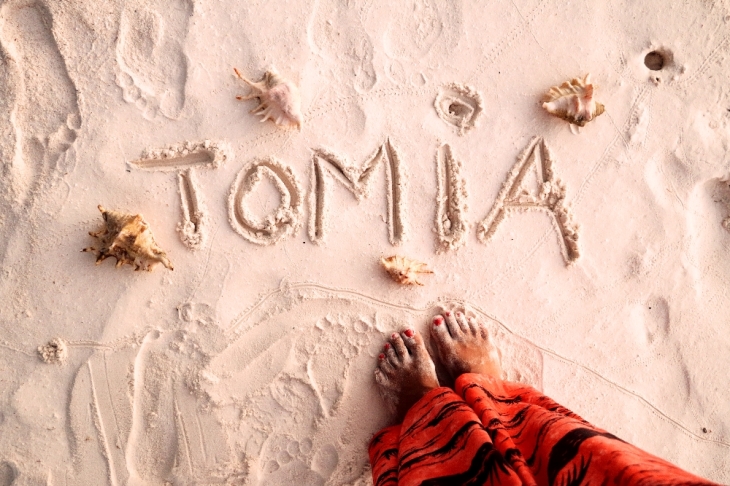
***
“I can’t stand them!” the German diver was sputtering through her shivers as she stripped out of her wetsuit. “They are so arrogant! Did you know,” she continued her rant as she sought the after-dive comforts of hot tea and sunlight, “that in the German dive expos, they advertise themselves as the only dive provider in Tomia?” She plopped herself down on the sunsoaked prow and huffed a good, angry-German huff.
She lives in Bali six months a year, writing and editing a German-language diving blog. She’s put in her time in Indonesia. She may be angry, but she knows what she’s about. When she’s not leveling critiques at every reef in Southeast Asia, she’s trying to set Dr. Yudi with a nice little gal she knows bak on Bali. Alas, the gal is Hindu, and Yudi—and his parents—prefer him to marry within his Christian faith.
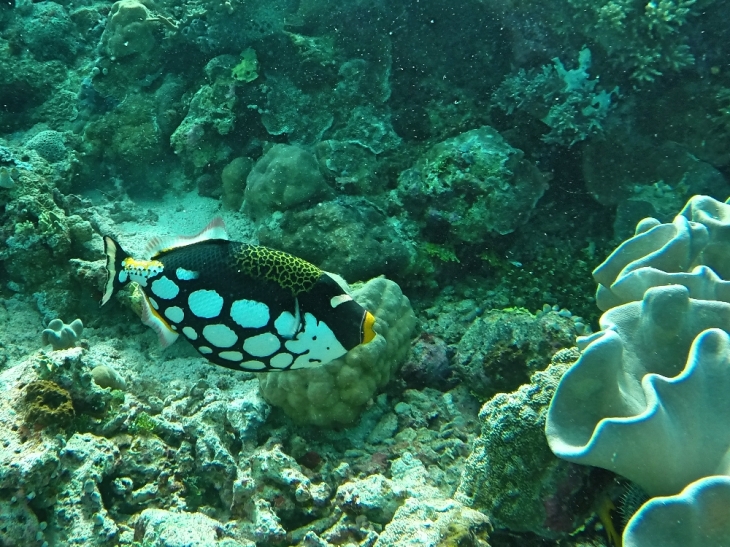
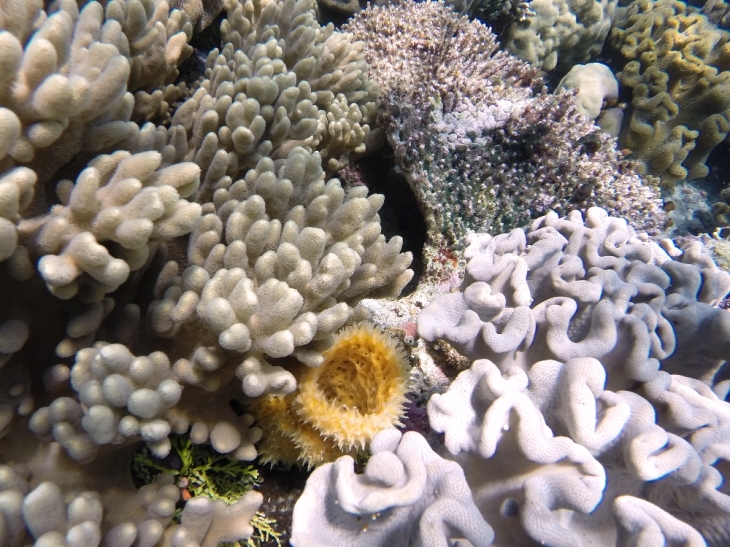
Let the scientists sort this stuff out.
For now, though, the German is still on the topic of the Dive Resort’s police boats.
“They think they own these reefs! Just look at how they send their police after us! What are they going to do to us anyway?”
Yudi shrugged his rugged shoulders and glanced back—our boat was skipping from the reef and further from sight of the resort. But we’d be back. We had to come back. Yudi had a half-dozen diving guests gorging themselves at the resort buffet. We’d be back in an hour to pick them up.
“You bring all these people here to eat there fifty-euro buffet,” – the German couldn’t be stopped—“and they still chase you off their reef! How can they justify such arrogance?”
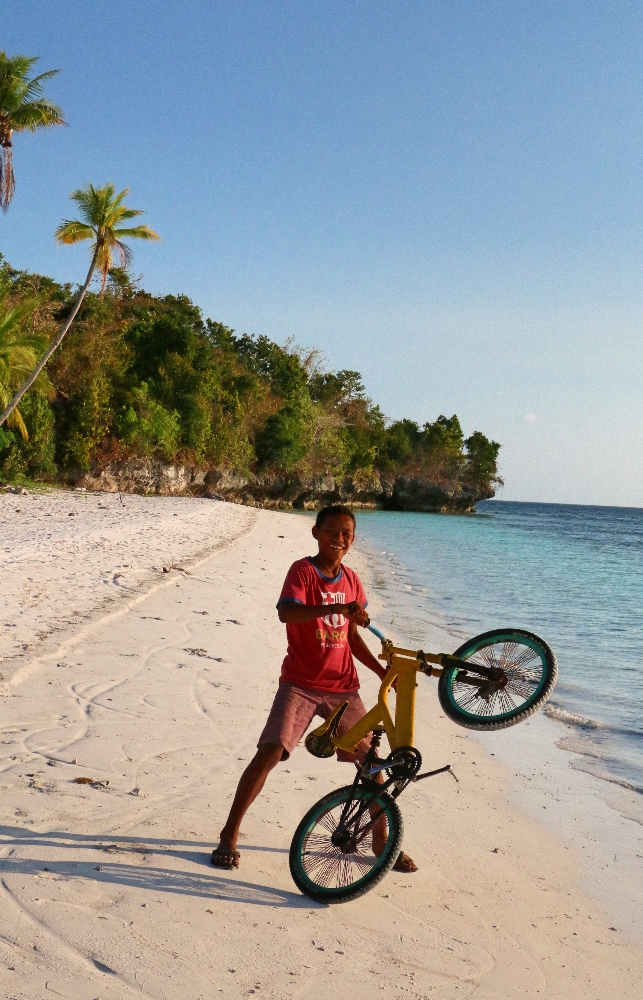
Andy and I looked at one another. We knew why. It involved those six buffet-goers. It involved another four who had ponied up a combined 1500 USD to stay the night in a WDR bungalow. It involved us, too, guests paying a total of twenty-eight dollars a night for not only our room but all-you-can-eat food for two as well. We were also guilty of the worst sin in Wakatobi: we just snorkel, no scuba.
Yudi’s guests, and therefore the man himself, symbolize the shifting paradigm of Indonesia’s tourism.
Wakatobi used to be hard to get to. I mean, it used to be harder. This trip, we took a total of three flights and nearly an entire day to leave Jakarta and touch down in Wangi-wangi, and then another half-day chugging through a diesel-fume madhouse of a public boat to land on Tomia. That’s about half the time and quarter of the headache travelers in the olden days had to put up with to arrive.
By olden days, I mean something before summer 2015, when the newly renovated airport terminal – half the size of a Wal-Mart—opened up for business.
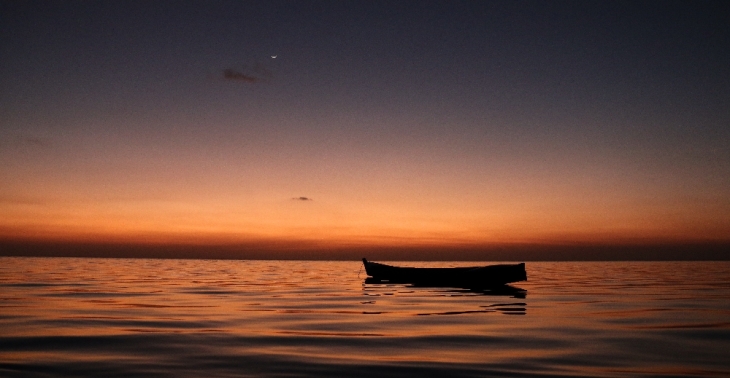
Back then, Wakatobi Dive Resort skipped fat-wallet guests the trouble, whisking them straight from Bali in a private jet straight to Tomia itself, via a private landing strip only they are authorized to use.
It was a lovely little system—keeping the resort excluded from all but the bucket-list divers and bling-bling divas. Oh, and a handful of ill-showered backpackers living on instant noodles and killing time in the tropics who might possibly try out the labyrinth of boats and bedbugs needed to arrive by other methods.
Indonesia, though, had other plans – and a burgeoning middle class to make them possible. Such plans include the airport renovation and domestic flight to up-and-coming tourist locales. Such middle class includes, well, those guys shelling out big bucks for the one-night-stay in opulence, and the gluttonous six at the buffet table.
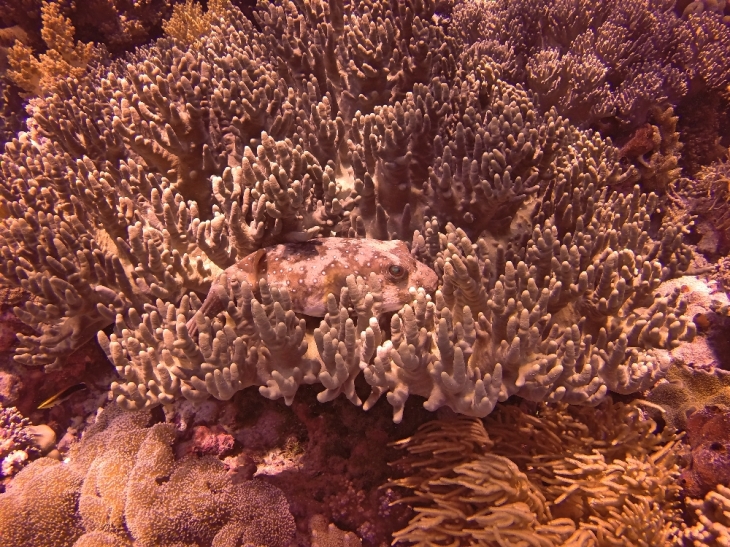
OK, upper-middle class, apparently.
These guys are a loud and laughing bunch. A twenty-something group reliving high school memories while sharing a trip out to Wakatobi. They spend more time in their selfies than in the water, perhaps, and more money on an Instagram-able buffet than on boats to the reefs. Their dives are mostly the “discovery” type, limited to single digit meters and holding the hand of the divemaster, because while they may be foodies, they certainly aren’t dive junkies, and few, if any, actually hold certifications.
I-phones in plastic sleeves dangle from their necks, and no evening is complete without liking each other’s latest profile pic.
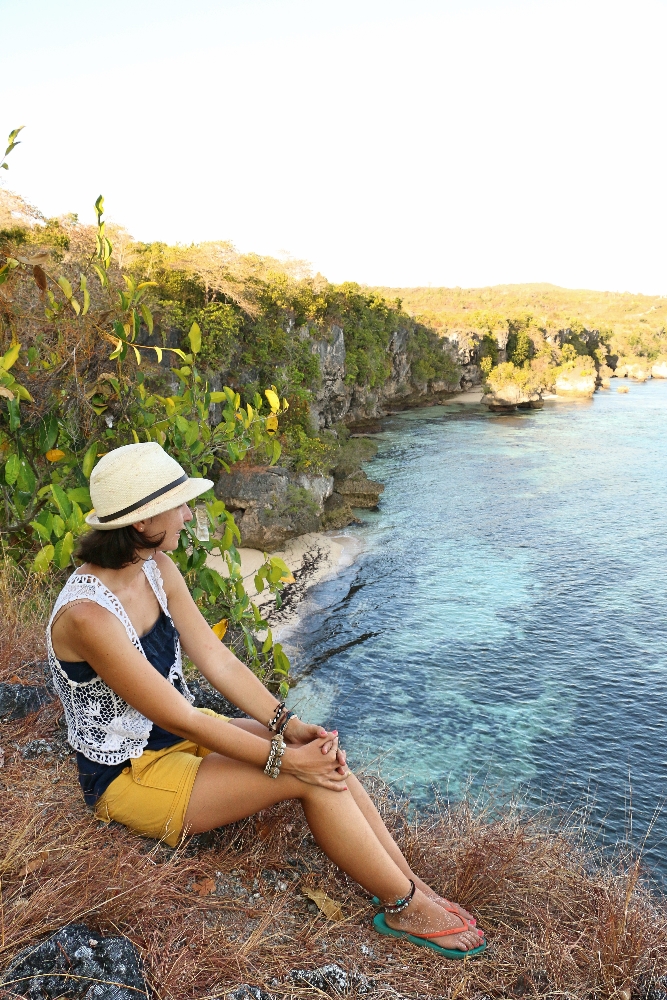
These are what the new tourists of Wakatobi look like.
These are what the resort is afraid of.
And of Yudi, in his friendly disposition and quest for exploring every reef imaginable, who welcomes them. He finds them budget lodging.
He gets them.
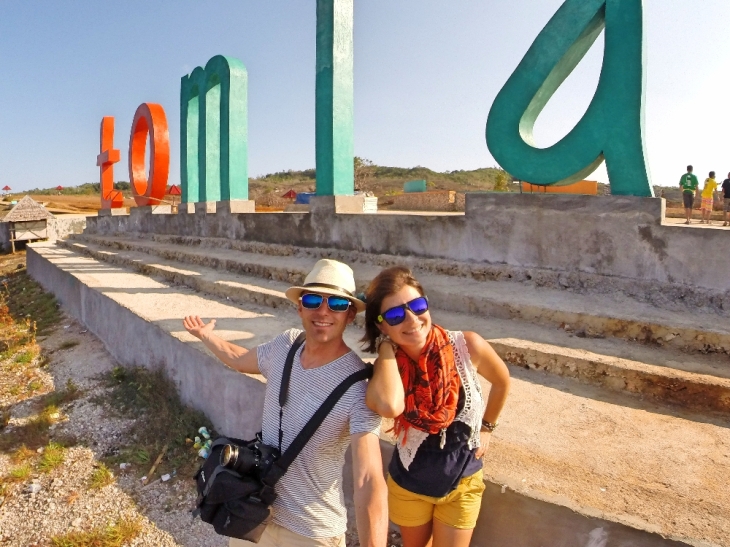
After all, he’s one of them. Same age. Same ethnicity. Same family story. Same expectations of small business and family. The same. The same.
And putting down roots on an island where you’re the sole minority, it’s a kind of nice to welcome a laughing gaggle of unban Jakartans under your roof and into your life. The fact that they’re not quite so diving savvy despite floating over some of the best reefs in existence doesn’t bother Yudi.
He likes the company, and he likes to think he helping a new generation of Indonesians be proud of their nation.
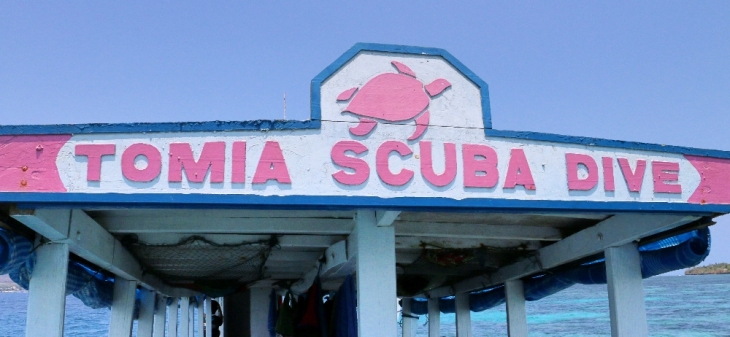
But it raises the hackles of the WDR, who dread a Tomia whose walls are down and whose airport is up, who sprouts a new guesthouse every month, and who crowds the reefs with boats not quite so spit-shined and wi-fi ready.
For decades they’ve been the sole provider of world-class dive services on peerless reefs.
And now Yudi is prying open the doors for a new type of tourist: The Indonesian tourists like them. The budget snorkelers like us.
***
Alternate dive completed, grumpy German sated, we headed back toward the resort and welcomed aboard the ten guests of Tomia the Wakatobi Dive Resort would rather not acknowledge.
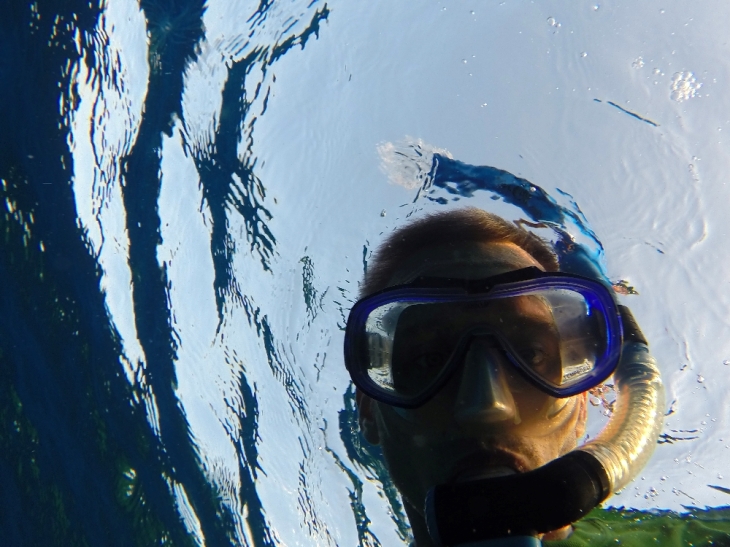
We were eager to hear the juicy details. What was it like on the inside? See any celebrities?
The food? Pretty OK.
The style? Good, but what else would you expect?
The service? Yeah. It was good. I mean, the place is five-star, right?
As of October 2015, these guys, this bungalow crew of Yudi’s, the ones who dropped a pretty penny for a WDR stay, brought the number of local Indonesian guests up to a grand total of twenty-five.
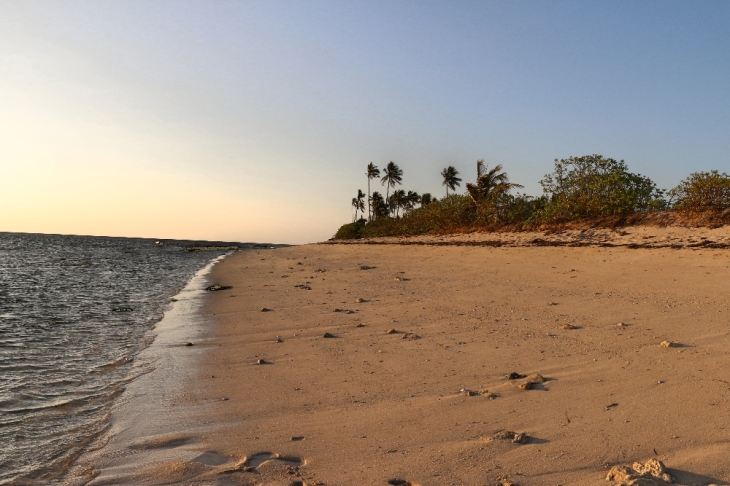
“Its always full,” Yudi replied to my question. “Tomia is great year-round, so guests are always there.”
“And only twenty-five of their own!” The German erupted again into the tropic backdrop of palms plastered against the aqua sky, “Only twenty-five of their own in a year!”
Meanwhile, Yudi’s guests were giggling onto a giant inflatable rubber ducky and splashing like crazy in the pristine temple of one of the most hallowed reefs in the universe. They snapped pictures in their oversized sunglasses, and left the dive gear waiting on the boat.
If there would be parasailing and banana boats and jet-skis with hover-boots slamming across the surf, they’d probably be in line already.
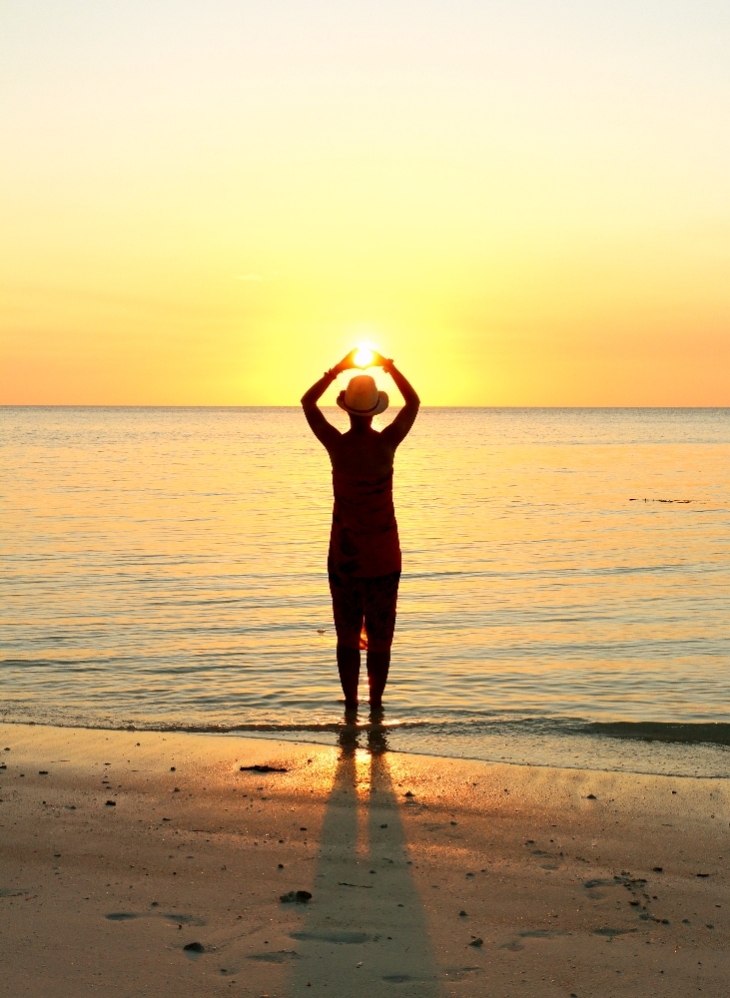
Perhaps it’s no wonder the guards chased our boat away. Perhaps that’s what they foresee happening to Tomia.
This is the reef; this is Wakatobi. This is Yudi, whose quest for part-time adventure fuels the selfies of literally… um… dozens of budget-class tourists each year. In the long weeks between, it’s solo dives and days at the office. It’s back to being an outsider on an island that still eats raw sea urchin at the sunset, that sends messages by way of schoolchild, that features unreliable electricity, and that goes to sleep before eight.
Yudi has long since passed his two-year commitment to serve the community of Pulau Tomia. He passed that years ago.
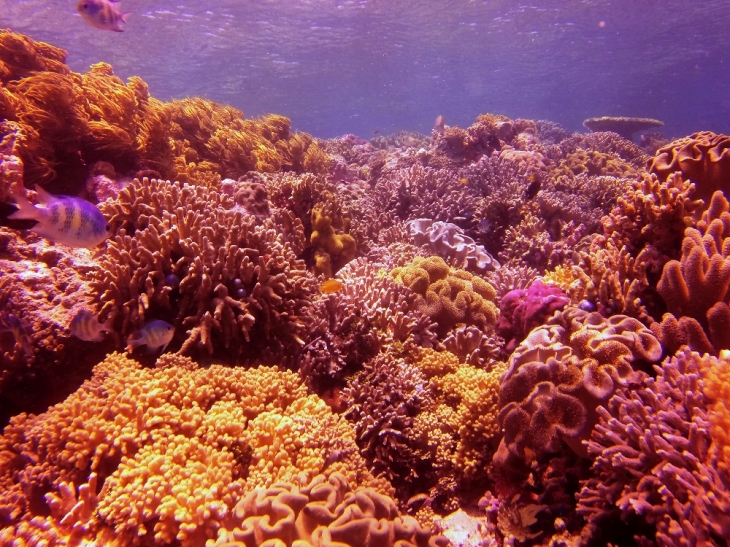
But he stays.
And he dives.
He hopes one day his parents will make the flights out to Wakatobi, will brave the boats to Tomia. “But my parents are quite old,” he confides to me. “And they cannot swim.”
He stops there, but he doesn’t need to go on. I see what he means: that he will never share his greatest treasure with those he loves the most.
“How often do you go back to Jakarta?” I ask him.
Yudi shrugs and stares ahead. “I went last year,” he says. “Yes, maybe once a year.”
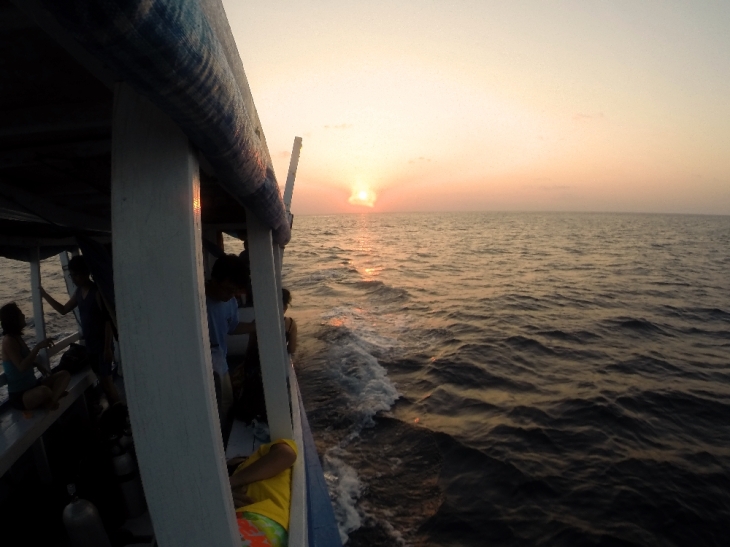
His clients have already climbed back aboard and are discussing the lattes and espressos of the quirkiest cafes in South Jakarta.
***
I press for one last dip into the tides. Yudi brings me out to Fan 38, a strong-current site across the channel from both Tomia and its cash-magnet resort. The sun is dipping into the horizon, and the salty current sweeps powerfully across the bow. The others stay aboard – too cold, they say. But you go and have fun. I think they’re discussing Iron Man and a new release of a Samsung phone.
So I jump in. In less than a second, I’m certain that there’s no way I could ever swim against the current. It blasts me away on the wide sweep of its river, and the only option left is to float along.
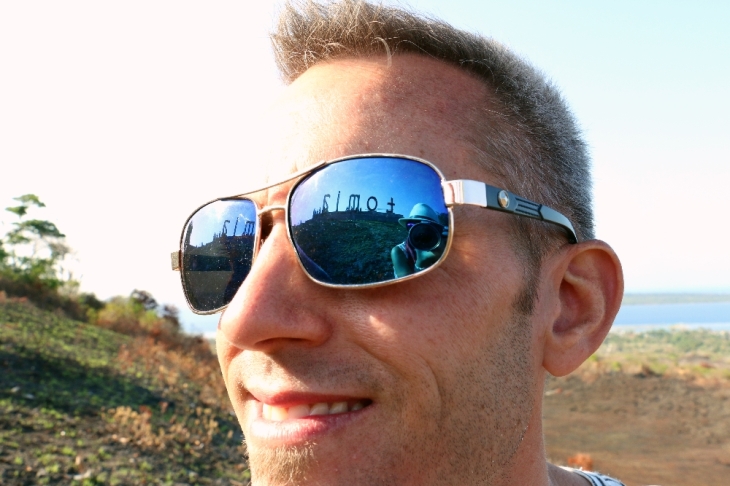
Yudi never anchors to the reefs, so his boat, German and urbanites and selfie-sticks and all, comes crashing along the current as well.
Below, the reefs bubble up in thousand colors of bursting life and pan across the entire horizon of my goggles. That is, until they fall vertically into a wall impossibly tangled in several hundred species of coral and tens of thousands of flitting fishes. It’s a greater display of life and variety that a land-locked Missouri boy could ever have dreamed up.
Across the channel, yuppies are smacking lips with overpriced sea-bass, villagers are refraining from dynamiting reefs, and the mosques are starting up their sunset calls to piety. Yudi’s clinic is manned by the nurses, and the Wakatobi Dive Resort might just be drafting up a formal complaint for him drifting a boat within a half-kilometer of a bungalow of theirs.
The best thing to do is float along.
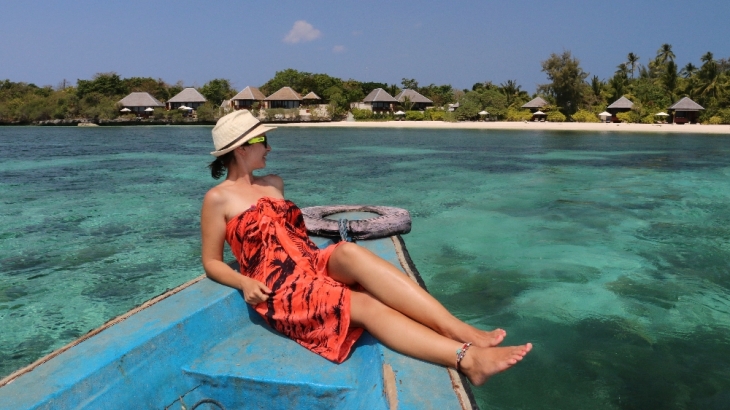
Giant barracudas lurk in the current and eye me gliding past. Turtles feed on the distant reefs, and a million tiny fishes pulse in and out of the antlers and pleats of the endless reef.
Several islands away is a recently renovated airport shuttling handfuls of guests more comfortably to the shores, and another coast hosts a reef conservation barracks empty for the off-season. A dozen old boats are chugging among these shores, and a quibble over diving rights and types of clients is rocking the sun-stained boat.
The sun sinks further into the horizon. The barracuda shimmies its gleaming tail and zips instantly down the drop-off.
This may be the most amazing scene our planet offers, I breathed into the plastic tube. No one heard my voice.
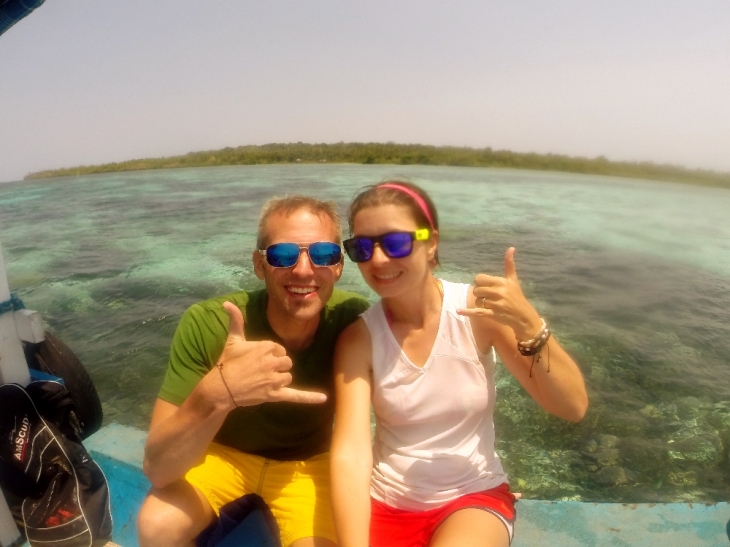
***
The next morning, there is no need for Yudi to make the four-hour haul with us back to airport on Wangi Wangi. But he grabs a backpack and a couple tee-shirts and climbs aboard. “I’ll stay a couple days with friends there,” he nods. “We might dive.”
Wakatobi Dive Resort may disdain his buddy-buddy methods and his backpacker prices and his less-than-sophisticated clientele, but Dr. Yudi presses on. Whether it’s from simple avarice for more guests and income, or from a profound altruism that teaches him to work among the villagers of Tomia rather than the moneyed Jakartan beehive, or whether from an implacable fascination with the reefs he cannot bring himself to leave, Yudi presses on with his diving and his guiding.
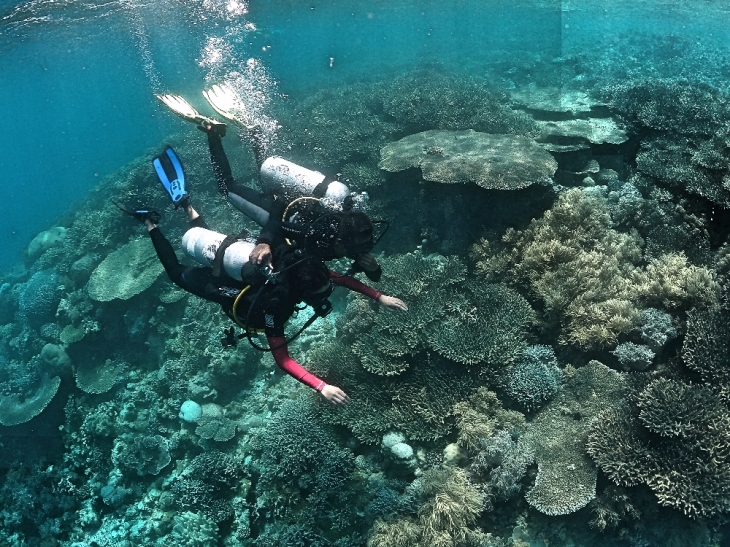
He accompanies us all the way to the airport. We take a picture with him.
As we waggle through security screenings, he’s standing outside in the Sulawesi sun. Alone again.
He’ll be back in Tomia before Wednesday, I’d wager, and back underwater.
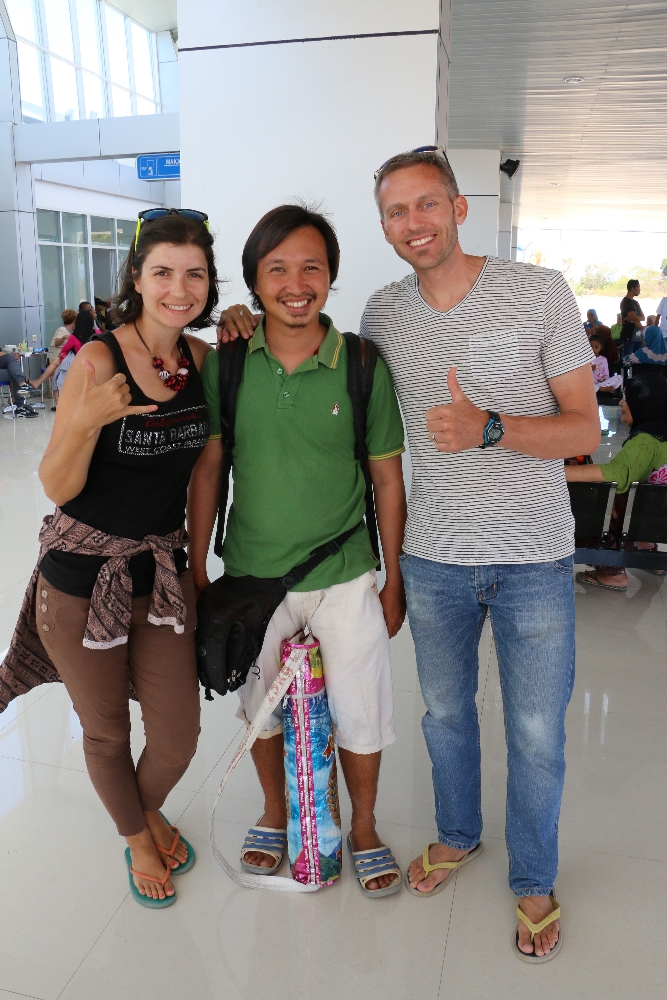
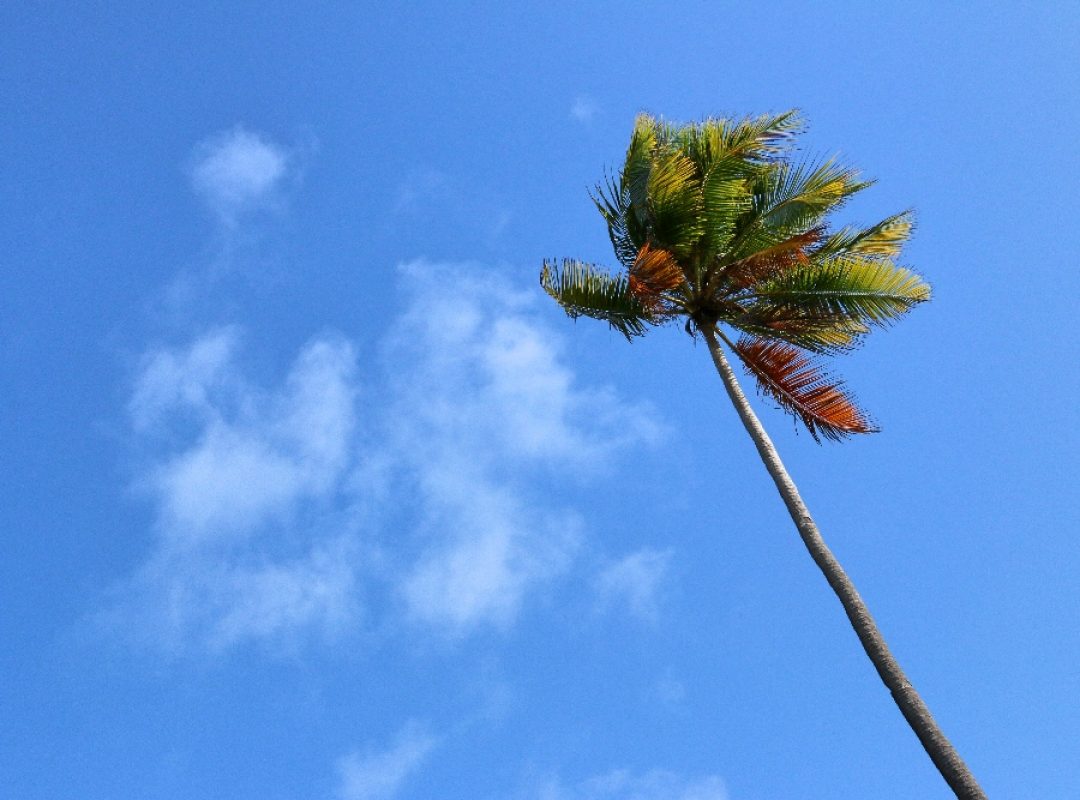

Lots of great info, thanks for sharing! We’re planning a trip to Wakatobi next month for about a week for mainly snorkeling. Which island stood out the most for you, water-wise, Wangi-Wangi, Hoga or Tomia?
LikeLike
Glad you found the information useful. We loved Wakatobi all the way around, but the corals and sea life were definitely best in Tomia. Whenever we make it back there, we’ll head straight for Tomia,
LikeLike